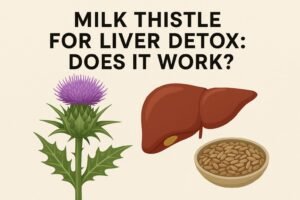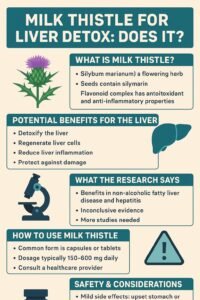In the modern world, your liver works overtime. From the food you eat to the air you breathe, your liver is your body’s natural filter—processing toxins, breaking down alcohol, managing blood sugar, and even storing essential nutrients. With the rise of detox culture, many people are turning to natural remedies to give their liver a helping hand. One such remedy that consistently tops the list is milk thistle. But what is milk thistle, and does it actually work to detox your liver?
In this article, we’ll dive deep into the science, history, and health claims behind milk thistle. You’ll learn whether it truly helps cleanse your liver—or if it’s just another health trend with more hype than substance.
What Is Milk Thistle?
Milk thistle (Silybum marianum) is a flowering herb related to the daisy and ragweed family. It’s native to Mediterranean countries but is now found around the world. The plant gets its name from the white veins on its large, prickly leaves, which—as legend says—were caused by a drop of the Virgin Mary’s milk.
The seeds of the milk thistle plant are the main source of its medicinal properties. These seeds contain a group of plant compounds known as silymarin, which is widely regarded as the active ingredient responsible for the plant’s therapeutic effects.
Silymarin is a complex of flavonolignans, including silybin, silydianin, and silychristin—compounds that have powerful antioxidant and anti-inflammatory properties.
Why Is Liver Detox Important?
Before we assess whether milk thistle can help detox your liver, let’s take a step back and understand what liver detoxification actually means.
Your liver is your body’s natural detoxifier. It:
-
Breaks down harmful substances (like alcohol and drugs)
-
Filters blood from the digestive tract
-
Produces bile to carry away waste and digest fats
-
Stores glycogen and essential vitamins
-
Metabolizes fats, proteins, and carbohydrates
Given this crucial role, it’s understandable why liver health is a major concern. Poor liver function can lead to conditions like fatty liver disease, hepatitis, cirrhosis, and even liver cancer.
But here’s the truth: your liver doesn’t need a special product or pill to “detox.” It’s already designed to detox your body every single day. The goal of any supplement—like milk thistle—is to support liver health, not magically cleanse it overnight.
The Claims: What Is Milk Thistle Supposed to Do?
Proponents of milk thistle claim it can:
-
Detoxify the liver
-
Regenerate liver cells
-
Reduce liver inflammation
-
Protect against liver damage from alcohol or drugs
-
Improve symptoms of liver diseases such as hepatitis and cirrhosis
But are these claims scientifically sound?
What Does the Research Say?
Milk thistle has been used for over 2,000 years in traditional medicine. Modern science has caught on, and many studies have looked into its potential benefits—especially regarding liver health.
Liver Disease Support
Some studies suggest milk thistle may be beneficial in treating liver diseases such as non-alcoholic fatty liver disease (NAFLD), alcoholic liver disease, hepatitis, and even cirrhosis.
-
A 2017 review of clinical trials found that milk thistle may reduce liver-related mortality in patients with liver diseases, particularly in those with cirrhosis or hepatitis C.
-
Another meta-analysis published in the American Journal of Gastroenterology reported improvements in liver enzyme levels (like ALT and AST) in patients who used milk thistle.
However, most of these studies point out one thing: the results are promising but not conclusive. There’s still a need for more large-scale, high-quality clinical trials.
Protection Against Toxins and Alcohol
Milk thistle’s silymarin content has shown potential in protecting liver cells from damage caused by toxins and alcohol.
-
Animal studies have demonstrated that silymarin can shield liver cells from damage by promoting protein synthesis and cell regeneration.
-
In people who consume alcohol regularly, some studies show milk thistle may reduce liver enzyme elevations—a marker of liver stress.
Again, the effects seem beneficial but vary from person to person.
Antioxidant and Anti-Inflammatory Effects
Silymarin is a powerful antioxidant that helps combat oxidative stress—a major contributor to liver damage and aging.
-
It’s believed to increase glutathione levels in the liver, a key antioxidant your body uses to fight toxins.
-
It also reduces inflammation by blocking the production of certain pro-inflammatory enzymes.
How to Use Milk Thistle for Liver Support
If you’re considering using milk thistle to support your liver, here’s how to do it safely:
Forms Available:
-
Capsules/Tablets: The most common form. Standardized extracts usually contain 70–80% silymarin.
-
Liquid Extracts: May offer faster absorption.
-
Tea: Made from crushed seeds, though it’s less potent than extract forms.
-
Powder: Can be mixed into smoothies or drinks.
Dosage:
Typical daily dosages range from 150 mg to 600 mg of silymarin, depending on the condition being treated. Always follow the instructions on the label or consult your healthcare provider.
When to Take It:
Milk thistle is usually taken once or twice a day with meals to enhance absorption.
Is Milk Thistle Safe?
Milk thistle is generally considered safe for most people when taken in appropriate doses. However, as with any supplement, there are a few things to be aware of:
Potential Side Effects:
-
Upset stomach
-
Diarrhea
-
Bloating
-
Allergic reactions (especially in people allergic to plants like ragweed, daisies, or marigolds)
Interactions:
Milk thistle may interact with certain medications, especially:
-
Blood thinners (warfarin)
-
Diabetes medications (may lower blood sugar)
-
Antipsychotics
-
Birth control pills
Always talk to your doctor if you are on medication or have a pre-existing condition before starting any new supplement.
Who Should Consider Using Milk Thistle?
Milk thistle may be especially helpful for:
-
People with liver disease: Including hepatitis, NAFLD, or cirrhosis.
-
Heavy drinkers or past alcohol users: To support liver recovery.
-
Those on liver-straining medications: Like chemotherapy, statins, or antifungals.
-
Health-conscious individuals: Looking to support natural detoxification and antioxidant activity.
>>> Best organic milk thistle supplement
Who Should Avoid It?
You may want to avoid milk thistle if:
-
You’re pregnant or breastfeeding (insufficient safety data)
-
You have hormone-sensitive conditions (silymarin may act like estrogen)
-
You’re allergic to ragweed or similar plants
Can Milk Thistle Be Part of a Liver Detox Plan?
If you’re serious about supporting your liver, remember this: no supplement can do the work alone.
Here’s how milk thistle fits into a comprehensive liver care routine:
Combine With:
-
Hydration: Water is your liver’s best friend.
-
Whole Foods: Focus on fruits, veggies, and fiber-rich foods.
-
Avoid Processed Sugar and Alcohol: These stress the liver.
-
Exercise: Helps reduce fat accumulation in the liver.
-
Sleep: Your liver regenerates most efficiently during rest.
The Bottom Line: Does It Really Work?
Yes—but with caveats.
Milk thistle is not a magic detox pill. However, scientific evidence supports its role as a supportive supplement for liver health, especially in individuals with liver stress or disease. It works by offering antioxidant protection, reducing inflammation, and potentially aiding liver cell regeneration.
While it won’t cleanse your liver overnight, it can be a valuable part of a broader wellness plan—especially when combined with a clean diet, exercise, and lifestyle changes.
Read more >>> Clinical review of Milk Thistle for liver diseases (PubMed)
Final Thoughts
If you’re feeling sluggish, dealing with a fatty liver diagnosis, or simply want to support your liver naturally, milk thistle might be worth trying. With a good safety profile and a long history of traditional use, it offers a gentle yet effective way to help your liver do what it does best—filter, protect, and keep your body in balance.
Just remember: no supplement replaces a healthy lifestyle. Let milk thistle be your ally—not your only line of defense.

